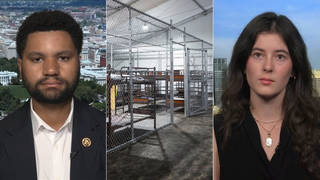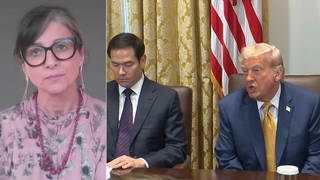
Israeli police re-arrested nuclear whistleblower Mordechai Vanunu seven months after he was released from an 18-year jail term for leaking secrets about Israel’s nuclear program. He was arrested for allegedly passing on classified information to unnamed international parties. [includes rush transcript]
As the world’s attention focused on the death of Yasser Arafat, Israeli police re-arrested nuclear whistleblower Mordechai Vanunu early this morning. Police also searched his room in East Jerusalem and confiscated documents and other materials. The arrest comes seven months after he was released from an 18-year jail term for leaking secrets about Israel’s nuclear program. The Guardian of London reports Israeli police arrested him for allegedly passing on classified information to unnamed international parties.
Since his release Mordechai Vanunu has been barred from speaking with foreign journalists. But he has broken this ban with a handful of news organizations including Democracy Now. Early in the morning of August 18 I reached Mordechai Vanunu in East Jerusalem and spoke to him for an hour. It was his first broadcast interview with the U.S. media.
- Modechai Vanunu, interviewed on Democracy Now, August 18, 2004.
- Ali Abunimah, founder of the Electronic Intifada.
- Listen/Watch Democracy Now! exclusive interview with Mordechai Vanunu
Transcript
AMY GOODMAN: Since his release, Mordechai Vanunu has been barred from speaking to foreign journalists, but he broke that ban with Democracy Now! and a few other news organizations, and had an hour-long conversation with us. Early in the morning of August 18, I reached Mordechai Vanunu in East Jerusalem, spoke to him for about an hour. It was the first national broadcast interview done in the U.S. media. We’ll end today — right now, we’re going to turn to that excerpt, just a small excerpt, of what he had to say then.
AMY GOODMAN: And if they do end up putting you back in detention, if they jailed you again, how do you feel about that?
MORDECHAI VANUNU: I would feel very bad but I will continue to demand to be a human being, to believe and to behave as a human being; to have the right to speak; the right to have freedom of speech. And I will continue to demand my total freedom to leave Israel. I hope they will not do not do such a mistake and someone — possibly from abroad, from the United States or Europe — will tell them that they should respect the human rights of this man. And to end this game of tricking the world by claiming there is no atomic bombs when all the world knowing exactly what they do and exactly what they saw when I gave photos to all of the world.
AMY GOODMAN: Mordechai Vanunu speaking to Democracy Now! August 18, just rearrested today. You can hear the full interview at democracynow.org. On the line with us, Ali Abunimah, your response to Mordechai Vanunu, and then, final response on Yasser Arafat.
ALI ABUNIMAH: Well, I’m not surprised that he has been arrested. I think it was a matter of time. Israel never wanted to release him. Back in the 1980’s when Israel was even then a more law abiding country compared with today, they sentenced him to 18 years, but Israel today is a country that has no real rule of law, that is operating like some of — the worst [inaudible] in the world. And what we’re seeing is a pattern, the recent report from John Dugard, the Special Rapporteur of the U.N. on human rights who is a South African lawyer and former member of South Africa’s Truth and Reconciliation Commission. In his last report, he pointed out the growing similarities between Israel and apartheid South Africa, and one of the tactics that apartheid South Africa used in its death throes, in its dying phase, was the banning of individuals, the arbitrary arrest of individuals, the total abandonment even of the pretense of the rule of law. And in Israel, we’re seeing routinely journalists shot, expelled. People visit the country now and are interrogated at the airport and expelled if there is the mere suspicion that they might sympathize with the universal cause of human rights and freedom. So Israel is descending into this kind of situation. With the passing of Yasser Arafat, I urge people to listen through the fog, which is going to be blanketed over this issue. The issue is not which Palestinian leader is elevated by the likes of George Bush and Ariel Sharon. If we want to talk about leadership, the Israelis really have nothing to boast about when you look at their leadership: a gang of people who have been involved in war crimes and butchery and murder for all of their lives. The issue is ending the occupation, ending the military dictatorship which rules the lives of millions of Palestinians, and any Palestinian leader who is — who represents Palestinians will be able to participate in the peace process whose clear goal is a rapid and immediate end to the occupation. Israel and the United States continue saying that the Palestinians have to jump through all of these hoops and find excuses to prevent freedom, to prevent peace. We are going to live with this conflict for a long time. So, on this day, I share the sadness of all Palestinians and many people around the world. It’s a day of reflection for all of us. It’s a sad and poignant coincidence that it falls on Veterans Day in the United States when we also think about the catastrophic results of the United States war in Iraq. Leaders who lecture us about peace and how to make peace while waging war in Iraq really should not be our moral guides. Our moral guides should be the principles of freedom, justice, and equality for Palestinians, Israelis and everyone else in this world.
AMY GOODMAN: Ali Abunimah, speaking to us from the streets of Philadelphia. He is the founder of electronicintifada.net.













Media Options